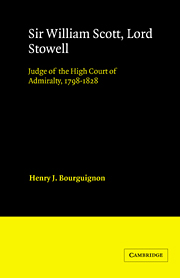Book contents
- Frontmatter
- Contents
- Preface
- List of abbreviations
- 1 Survey of English admiralty jurisdiction: how did it vanish?
- 2 Sir William Scott – a biographical sketch
- 3 The law of the instance court
- 4 Prize law: nationality – a study in detail
- 5 Prize law – a survey
- 6 Scott's judicial philosophy
- 7 Scott's influence
- Appendix: the Stowell notebooks
- Bibliography of primary sources
- Index
- CAMBRIDGE STUDIES IN ENGLISH LEGAL HISTORY
5 - Prize law – a survey
Published online by Cambridge University Press: 29 October 2009
- Frontmatter
- Contents
- Preface
- List of abbreviations
- 1 Survey of English admiralty jurisdiction: how did it vanish?
- 2 Sir William Scott – a biographical sketch
- 3 The law of the instance court
- 4 Prize law: nationality – a study in detail
- 5 Prize law – a survey
- 6 Scott's judicial philosophy
- 7 Scott's influence
- Appendix: the Stowell notebooks
- Bibliography of primary sources
- Index
- CAMBRIDGE STUDIES IN ENGLISH LEGAL HISTORY
Summary
The brevity of the treatment of the various important subjects in this chapter should not obscure the fact that the admiralty court dealt with each in at least as much detail as it dealt with the issues of nationality discussed in the last chapter.
NEUTRAL RIGHTS AND DUTIES – A GENERAL OVERVIEW
The high seas in time of war served two partially irreconcilable functions. As in peace, they served as the broad, free highways for the world's commerce. In wartime, however, the high seas became the preferred battle fields for the dominant naval power. Maritime warfare, therefore, became the flash point for claims of neutral rights. Neutrals asserted the right to carry on their commerce with the rest of the world, undisturbed by the warfare in which they were not parties and in which they sought to remain friendly to all belligerents.
Most of the law of maritime warfare after the time of Grotius was an attempt to balance the legitimate interests of the belligerent nations against the rights of non-belligerents or neutrals. Blockade, contraband and colonial trade are merely specific examples of this tension between neutral rights and neutral duties on the one hand, and the rights of the belligerents on the other. This law of maritime warfare had evolved within the context of the law of nations, which had not sharply distinguished between the law and the morality of international relations. Scott, who certainly knew the often vague and conflicting writings on the law of nations as well as anyone in England, had good reasons to look first to the settled precedents of the English prize courts for clearer guidance in deciding cases.
- Type
- Chapter
- Information
- Sir William Scott, Lord StowellJudge of the High Court of Admiralty, 1798–1828, pp. 172 - 242Publisher: Cambridge University PressPrint publication year: 1987

